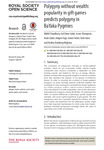Please use this identifier to cite or link to this item:
http://lib.hpu.edu.vn/handle/123456789/21762Full metadata record
| DC Field | Value | Language |
|---|---|---|
| dc.contributor.author | Chaudhary, Nikhil | en_US |
| dc.date.accessioned | 2016-06-25T01:57:25Z | |
| dc.date.available | 2016-06-25T01:57:25Z | |
| dc.date.issued | 2015 | en_US |
| dc.identifier.other | HPU4160258 | en_US |
| dc.identifier.uri | https://lib.hpu.edu.vn/handle/123456789/21762 | en_US |
| dc.description.abstract | The occurrence of polygynous marriage in hunter–gatherer societies, which do not accumulate wealth, remains largely unexplored since resource availability is dependent on male hunting capacity and limited by the lack of storage. Hunter– gatherer societies offer the greatest insight in to human evolution since they represent the majority of our species’ evolutionary history. In order to elucidate the evolution of hunter–gatherer polygyny, we study marriage patterns of BaYaka Pygmies | en_US |
| dc.format.extent | 8 p. | en_US |
| dc.format.mimetype | application/pdf | en_US |
| dc.language.iso | en | en_US |
| dc.publisher | The Royal Society | en_US |
| dc.subject | Behaviour | en_US |
| dc.subject | Ecology | en_US |
| dc.subject | Evolution | en_US |
| dc.subject | Polygyny | en_US |
| dc.subject | Hunter–gatherers | en_US |
| dc.subject | Social capital | en_US |
| dc.subject | Genetic quality | en_US |
| dc.subject | Social networks | en_US |
| dc.title | Polygyny without wealth | en_US |
| dc.type | Book | en_US |
| dc.size | 461KB | en_US |
| dc.department | Education | en_US |
| Appears in Collections: | Education | |
Files in This Item:
| File | Description | Size | Format | |
|---|---|---|---|---|
| 0141_Polygyny_without_wealth.pdf Restricted Access | 461.27 kB | Adobe PDF |  View/Open Request a copy |
Items in DSpace are protected by copyright, with all rights reserved, unless otherwise indicated.
